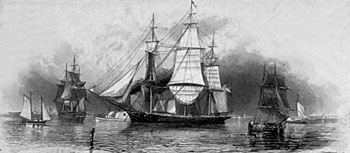- Page:
- 1 /
- 2
Homeward Bound
After three or four years at sea, officers and crew looked forward to returning home. The voyage had been both dangerous and tedious. Whales and storms had damaged boats. Young men, killed by shipboard accidents and disease, had been buried at sea. Seamen and ships' masters had argued about living and working conditions. Now the captain counted the barrels of whale oil that filled the cargo and declared the voyage "homeward bound." Shipmates united in their excitement for home; "all hardships and toils [were] soon forgotten. "
The journey home took several months and during this time, crews continued to pursue whales that might cross their path. At a certain point in the voyage, the smelly, greasy business of capturing whales ended. Sailors dismantled the tryworks and threw the brick and mortar into the sea. Some seamen tossed patched clothing and straw bedding overboard. Others finished making scrimshaw objects for loved ones on shore. Everyone continued to tend to the chores of maintaining and sailing the ocean-battered vessel.

Library of Congress